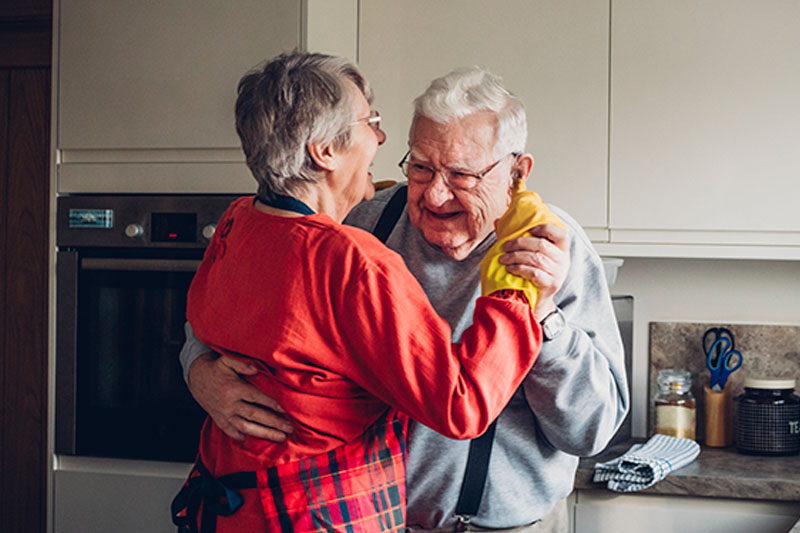
There are many advantages of exercise following a dementia diagnosis.
When an older adult has dementia or Alzheimer’s and all of the challenges the conditions entail, family care providers need a toolbox full of helpful strategies. Out of all the unique strategies care providers can use to aid in making life as meaningful, safe, and comfortable as it can possibly be, there is one very effective strategy that may be ignored: the advantages of exercise.
We know that exercise is necessary for all of us, both physically and mentally, and that doesn’t change with a dementia diagnosis. Exercise can help:
- Improve sleep
- Strengthen muscles, flexibility, balance, and circulation
- Decrease pain
- Decrease the possibility of falls
- Improve state of mind and outlook
- And more
Best of all, it is drug-free, so there are no unwanted side effects to worry about!
To encourage and motivate an older adult with dementia to engage in a fitness plan, plan to work out together. That way you can easily model the movements and help the individual when necessary – keeping in mind that performing the exercises as independently as possible is a good way to increase self-esteem and confidence.
Unsure where to begin? Try out these exercises, according to the senior’s ability level.
Activities for Early and Mid-Stage Dementia
These more advanced exercises work very well for a person with lesser cognitive impairment:
- Sign up (together!) for a workout class at your local senior center, YMCA, or gym. If the older adult likes being in the pool or may benefit from a lower impact workout, try water exercise.
- Dance! You can dance together in the privacy of home, register for a dance class, or bring the older adult to social events at your local senior center that include dancing. Bonus: music is incredibly helpful in stirring memories for seniors with dementia.
- Work together in the garden – raking, digging, planting, pulling weeds, picking vegetables and flowers. Being out in the fresh air is an excellent mood booster as well, plus the work produces a rewarding sense of purpose.
- Get cleaning! Household chores like sweeping, dusting, vacuuming, and even folding laundry are great ways to work in exercise, and completing these jobs together allows for conversations, reminiscing, and a sense of accomplishment when the tasks are done.
- Take a walk together – at the park, in a shopping mall, or just around the block. Stick to the same route if the senior prefers, or change it up from day to day if more variety is appreciated.
Activities for Later Stage Dementia
Modifications will have to be made as the disease advances, but there are still lots of opportunities to incorporate physical activity into the senior’s day, such as:
- Sit to stand: From a seated position, with as much support and assistance as needed, the senior will rise up to a standing position, pause for several seconds, and come back to a seated position. Repeat several times.
- Chair stretches: This video offers a number of different stretches you can attempt which will help strengthen and build muscles throughout the body.
- Bed stretches: For a senior who is bed-bound, moving and bending the arms and legs, whether independently or with assistance, can help ease stiff muscles.
Get in touch with Compassionate Nursing Services’ Town and Country memory care professionals for assistance with implementing the ideal (physician-approved) workout program for someone with dementia, along with the friendly companionship that makes exercise more pleasurable! Reach us today at 314-432-4312. Visit our Service Area page for more information about the many communities where we provide our award-winning home care services.
